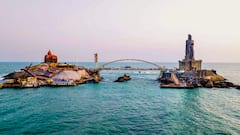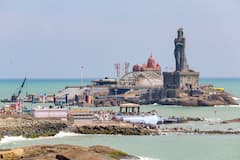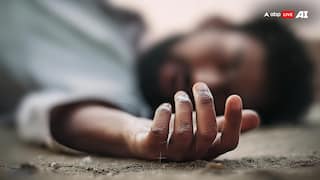49th Anniversary Of Emergency: Revisiting A Dark Chapter In India's History
The National Emergency was declared in India on June 25, 1975, by then-Prime Minister Indira Gandhi. It lasted for 21 months and is considered a dark chapter in Indian history due to widespread human rights violations.

49th Anniversary Of Emergency: June 25, 2024, marks the 49th anniversary of the National Emergency, a pivotal period in Indian history. On June 25, 1975, then-Prime Minister Indira Gandhi advised then-President Fakhruddin Ali Ahmed to declare a state of emergency across India, which lasted for 21 months. The announcement was made by PM Gandhi via All India Radio on June 26, 1975, marking the first time that the emergency was imposed on the grounds of “Internal disturbances in the country”.
This era is often viewed as a dark chapter in India's history due to widespread human rights violations, suppression of dissent, curtailment of civil liberties, and extreme press censorship.
What is a National Emergency?
Emergency provisions are detailed in Part XVIII of the Indian Constitution, with Article 352 addressing National Emergency. An emergency declared due to 'war' or 'external aggression' is termed 'External Emergency,' while one declared due to 'armed rebellion' is known as 'Internal Emergency.' The term 'armed rebellion' replaced 'internal disturbance' through the 44th Amendment Act.
Events Leading to Declaration of Emergency
The Congress Party's split in November 1969 marked the beginning of the crisis.
India faced severe economic challenges, with rampant inflation and food shortages. Political unrest surged, and widespread protests were held against Indira Gandhi's government.
The arrival of Jai Prakash Narayan, a revered Gandhian and freedom struggle hero, further intensified opposition, leading to the popular JP Movement.
The final trigger was the Allahabad High Court's verdict. Raj Narain, a socialist leader contested against Indira Gandhi from Raebareli in the 1971 parliamentary elections. He petitioned in court that her campaign involved government officials and also breached the amount allowed as an expenditure. Gandhi had to testify in court and she became the first Indian Prime Minister to do so. The court declared the election null and void.
She was banned from fighting any election for six years. The Times of India compared the Allahabad High Court order to "firing the Prime Minister for a traffic ticket". PM Gandhi moved the Supreme Court, which stated that while she could continue as Prime Minister, she wouldn't have voting rights in Lok Sabha till her plea was decided.
The day after the High Court judgment, the emergency was declared.
Opposition Leaders Jailed During Emergency
Before the Emergency was announced, the government laid the groundwork by passing draconian laws to target political opponents. The Maintenance of Internal Security Act (MISA) was passed, utilising Congress's overwhelming majority. Additionally, the Defence of India Act, originally enacted during the 1962 war with China, was renewed immediately after the Emergency was imposed. This law suspended the fundamental rights of anyone arrested under its provisions, including allowing for detention without explanation. Another law, the Conservation of Foreign Exchange and Prevention of Smuggling Activities Act, was also employed to target political rivals.
According to Indian Express, On the night of June 25, 1975, a sudden power cut descended upon Delhi’s Bahadur Shah Zafar Marg, home to many of the country’s largest newspapers. Across other parts of India, newspaper presses were raided, operations halted, and bundles of newspapers seized. In the early hours of the next morning, Prime Minister Indira Gandhi announced that the President had proclaimed Emergency due to “imminent security threats” to the nation. This declaration led to the suspension of constitutional rights and significant restrictions on press freedom. For several days, major newspapers could not be published. Gandhi expelled numerous foreign correspondents and over 200 journalists were arrested. Publications resumed two days later.
Opposition leaders, including Jayaprakash Narayan, Morarji Desai, Raj Narain, Mulayam Singh Yadav, Vijayaraje Scindia, Atal Bihar Vajpayee, Lal Krishna Advani, George Fernandes and Arun Jaitley, along with activists, trade unionists, and journalists critical of the government, were arrested.
Organisations such as the RSS, Left, and the Sikhs' 'Democracy Bachao Morcha' launched protests against the Emergency.
Sanjay Gandhi's national family planning campaign forced millions into sterilisation.
The most draconian impact was the passing of the 42nd Constitutional Amendment Act. It is also termed the 'mini-constitution' and had once altered several of the basic nature of the constitution.
End of Emergency
In a surprising move, Indira Gandhi called for elections on January 18, 1977, and released political prisoners. The emergency was officially lifted on March 21, 1977.
The united opposition, under the Janata Party, won the elections, leading to the Congress Party's significant defeat and Indira Gandhi's diminished popularity.
Morarji Desai became the Prime Minister of the first non-Congress government
This marked the end of one of the darkest chapters in the history of post-independent India.
ALSO READ | 'Mindset Is Very Much Alive': PM Modi Slams Congress As BJP Launches 'Dark Days Of Emergency' Campaign
PM Modi Recalls 'Dark Days Of Emergency' On 49th Anniversary
Prime Minister Narendra Modi recalled the 'Dark Days Of Emergency' slamming the Congress for subverting basic freedoms and trampling over the Constitution of India.
In a statement on X, Prime Minister Modi targeted the Congress, asserting, "Just to cling on to power, the then Congress Government disregarded every democratic principle and made the nation into a jail. Any person who disagreed with the Congress was tortured and harassed. Socially regressive policies were unleashed to target the weakest sections."
"Those who imposed the Emergency have no right to profess their love for our Constitution. These are the same people who have imposed Article 356 on innumerable occasions, got a Bill to destroy press freedom, destroyed federalism and violated every aspect of the Constitution," he asserted.
"The mindset which led to the imposition of the Emergency is very much alive among the same party which imposed it. They hide their disdain for the Constitution through their tokenism but the people of India have seen through their antics and that is why they have rejected them time and again," he further remarked.
Those who imposed the Emergency have no right to profess their love for our Constitution. These are the same people who have imposed Article 356 on innumerable occasions, got a Bill to destroy press freedom, destroyed federalism and violated every aspect of the Constitution.
— Narendra Modi (@narendramodi) June 25, 2024
On the other hand, Congress President Mallikarjun Kharge criticised the Prime Minister for revisiting the past to deflect from his own shortcomings.
“Narendra Modi ji, the country is looking forward to the future but you keep scratching the past to hide your failures. In the last 10 years, you made 140 crore Indians realise what 'undeclared emergency' is, which caused a deep trauma to democracy and the Constitution,” Kharge remarked in a post on X, formerly Twitter.
.@narendramodi जी,
— Mallikarjun Kharge (@kharge) June 25, 2024
देश भविष्य की ओर देख रहा है, आप अपनी कमियाँ छिपाने के लिए अतीत को ही कुरेदते रहते हैं।
पिछले 10 वर्षों में 140 करोड़ भारतीयों को आपने जो "Undeclared Emergency" का आभास करवाया उसने लोकतंत्र और संविधान को गहरा आघात पहुँचाया है।
पार्टियों को तोड़ना, चोर…
Kharge highlighted instances where he felt the government had failed to demonstrate consensus and cooperation, contrary to Modi's claims. He cited the suspension of 146 opposition MPs, the introduction of new criminal procedure codes without opposition input, and the relocation of statues of national stalwarts without consulting the opposition. Kharge also referenced the controversial farm laws, demonetisation, the lockdown, and the electoral bonds law as examples of unilateral decision-making by the government.
Trending News
Top Headlines






































